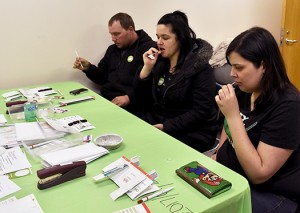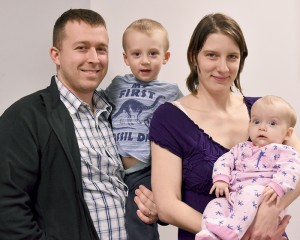Become a donor, save a life

Hayley Berthiaume, Danielle Fillion and Peter Kelly swab their cheeks to become bone marrow donors at a Canadian Blood Services building in Windsor. Photo by Alyssa Leonard.
By Alyssa Leonard
A Windsor family continues to urge young people to become bone marrow donors after losing their daughter to leukemia 12 years ago.
Three-year-old Katelyn Bedard lost her battle with leukemia in June 2005 after being unsuccessful in locating a bone marrow donor match. A month later, Katelyn’s father Bryan Bedard and his wife Joanne started the Katelyn Bedard Bone Marrow Association where they provide financial support to those undergoing a bone marrow transplant, sponsor bone marrow related research and bring awareness to the need for bone marrow donors.
The Canadian Blood Services match a donor whose six human leukocyte antigen markers, a protein found in most cells in a person’s body, are as close to the patient’s six HLA markers as possible. A person receives three markers from their mother and three markers from their father to make up their own six in their DNA.
The process requires four cheek swabs for a person to be registered. Bedard said they use skin cells from the donor’s cheeks that come from the swabs to check DNA for the HLA markers.
“Your best chance of finding that match is within your siblings because they got their three and three from the same two parents,” said Bedard. “There’s a one in four chance they are going to have that same combination that you got.”
Bedard said the chances of finding someone outside of a person’s siblings is extremely rare which is why they need as many people as possible to register. He said the Canadian Blood Services have found male donors have shown to provide a better outcome for the patient, so they try to recruit young male donors as often as possible.
A person can also sign up to become an organ donor. One organ donor can potentially save up to eight lives and by donating tissue and eyes they can also improve the lives of up to 50 people.
Kameron Chausse, a public relations student at St. Clair College, is alive today because of an organ donor. He received a liver transplant when he was 19 years old.
“From the point that I was directly told that I would require a transplant ‘sometime in the future’ to receiving one was about a year and a half,” said Chausse, now 25 years old.
Chausse said he felt exhausted throughout high school and received multiple misdiagnoses. It took four years until he received his official diagnosis of primary biliary cirrhosis, now known as primary biliary cholangitis, an autoimmune disorder that targets the bile duct and causes liver scarring.

Windsorite Charles Ducharme and his son Henrik, wife Tamara and daughter Madalayna; one of the 800 Canadian families waiting to find a bone marrow match. Photo by Alyssa Leonard.
According to Jennifer Long, the media relations coordinator for the Trillium Gift of Life Network, there were 1,302 transplants in Canada in 2016. Of these transplants, 720 were kidney transplants from donors both living and deceased.
“As of today there are 1,535 people waiting for a transplant in Ontario,” said Long.
She said the average wait time for a transplant varies by organ, with the shortest time of six months being a heart, liver, or lung and the longest being a kidney at four years and 10 months.
“I didn’t actually need to wait that long for a transplant,” said Chausse. “I was tremendously fortunate as my donor also saved or improved the lives of three other people – he gave his entire liver, both kidneys, and part of an eye.”
Chausse said he encourages people to sign up to become a donor because there are thousands of people in Canada in need of a transplant. He said it only takes a minute or two to register and all you need is a health card.
In 2008, the Trillium Gift of Life Network adopted an affirmative registry after discontinuing donor cards, as they were often unavailable when needed. Long said registration has been increasing over the last decade even with the new online registration process. Last year Ontario reached a milestone. Thirty per cent of the eligible population registered. In 2008, the registration rate was 16 per cent.
“There’s no guarantee that you can donate…but there’s always the chance that someone will be able to have a better life, if tragedy struck,” said Chausse.
For more information on becoming a donor, visit www.onematch.ca to become a bone marrow donor or www.beadonor.ca to become an organ donor.


